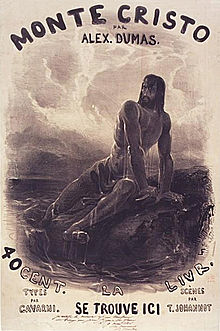The Count of Monte Cristo
Alexandre Dumas

Description
An adventure novel by French author Alexandre Dumas completed in 1844 - one of the author's most popular works.
| Length | Emails required |
|---|---|
| 15,404 lines | 386 (based on one per day) |
Preview - part4 of386
Chapter 92. The Suicide Chapter 93. Valentine Chapter 94. Maximilian’s Avowal Chapter 95. Father and Daughter VOLUME FIVE Chapter 96. The Contract Chapter 97. The Departure for Belgium Chapter 98. The Bell and Bottle Tavern Chapter 99. The Law Chapter 100. The Apparition Chapter 101. Locusta Chapter 102. Valentine Chapter 103. Maximilian Chapter 104. Danglars’ Signature Chapter 105. The Cemetery of Père-Lachaise Chapter 106. Dividing the Proceeds Chapter 107. The Lions’ Den Chapter 108. The Judge Chapter 109. The Assizes Chapter 110. The Indictment Chapter 111. Expiation Chapter 112. The Departure Chapter 113. The Past Chapter 114. Peppino Chapter 115. Luigi Vampa’s Bill of Fare Chapter 116. The Pardon Chapter 117. The Fifth of October VOLUME ONE Chapter 1. Marseilles—The Arrival On the 24th of February, 1815, the look-out at Notre-Dame de la Garde signalled the three-master, the Pharaon from Smyrna, Trieste, and Naples. As usual, a pilot put off immediately, and rounding the Château d’If, got on board the vessel between Cape Morgiou and Rion island. Immediately, and according to custom, the ramparts of Fort Saint-Jean were covered with spectators; it is always an event at Marseilles for a ship to come into port, especially when this ship, like the Pharaon, has been built, rigged, and laden at the old Phocee docks, and belongs to an owner of the city. The ship drew on and had safely passed the strait, which some volcanic shock has made between the Calasareigne and Jaros islands; had doubled Pomègue, and approached the harbor under topsails, jib, and spanker, but so slowly and sedately that the idlers, with that instinct which is the forerunner of evil, asked one another what misfortune could have happened on board. However, those experienced in navigation saw plainly that if any accident had occurred, it was not to the vessel herself, for she bore down with all the evidence of being skilfully handled, the anchor a-cockbill, the jib-boom guys already eased off, and standing by the side of the pilot, who was steering the Pharaon towards the narrow entrance of the inner port, was a young man, who, with activity and vigilant eye, watched every motion of the ship, and repeated each direction of the pilot. The vague disquietude which prevailed among the spectators had so much affected one of the crowd that he did not await the arrival of the vessel in harbor, but jumping into a small skiff, desired to be pulled alongside the Pharaon, which he reached as she rounded into La Réserve basin. When the young man on board saw this person approach, he left his station by the pilot, and, hat in hand, leaned over the ship’s bulwarks. He was a fine, tall, slim young fellow of eighteen or twenty, with black eyes, and hair as dark as a raven’s wing; and his whole appearance bespoke that calmness and resolution peculiar to men accustomed from their cradle to contend with danger.